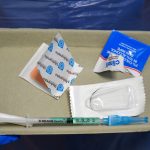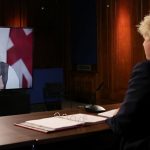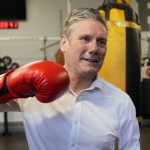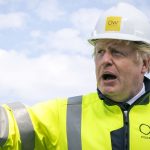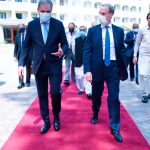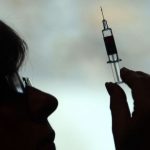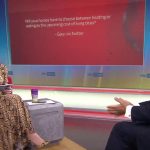The next coronavirus variants “could be more severe” than Omicron and future winters will be “tricky”, the government’s top medical advisers have warned.
Speaking at a Downing Street news briefing, England’s chief medical officer Professor Sir Chris Whitty stressed that new COVID variants may cause “significant problems” – including potentially a higher risk of hospitalisation than Omicron.
Meanwhile, England’s chief scientific adviser Sir Patrick Vallance added that “the virus will continue to evolve and it will probably will be quite fast for the next five years”.
“One thing this virus has taught us is not to be cocky,” he added.
“Quoting an American colleague, you can celebrate when the sun is shining, but always take the umbrella with you.”
The comments came hours after Boris Johnson unveiled his “living with COVID” plan, announcing that the legal requirement for people who test positive for coronavirus to self-isolate will be removed from Thursday.
The prime minister’s plan will also see free symptomatic and asymptomatic testing end in England from 1 April.
COVID: Remaining restrictions in England will be scrapped on Thursday and free testing to end in April, PM reveals
Boris Johnson making announcement in Commons today on plan for ‘living with COVID’ before Downing Street update at 7pm
Downing Street parties: Boris Johnson should not resign if police find he broke COVID rules, minister says
The changes will be subject to approval by Parliament.
Speaking at the Downing Street news briefing, Prof Whitty warned the country still has “high rates of Omicron” – with between one in 20 and one in 25 people believed to be infected at present – and that coronavirus remains “a very prominent infection”.
“As we look at the next weeks, we still have high rates of Omicron. I would urge people in terms of public health advice to still self isolate,” he added.
Prof Whitty also said that good surveillance, capacity to rapidly step up and protecting the most vulnerable are “the critical things that we need to maintain even beyond this next few weeks into the rest of this year and the rest of the way that we continue to manage this epidemic”.
He added that maximising ventilation, hand washing and using face masks in enclosed spaces with large numbers of people when there are significant numbers of cases remain important.
Opposition MPs earlier expressed concern that scientific evidence behind the government’s decision to scrap universal free testing in the spring had not been published.
Labour leader Sir Keir Starmer accused the PM’s approach of leaving the country “vulnerable”.
“These are decisions which will hit the lowest paid and the most insecure workers the hardest,” he said.
Liberal Democrat leader Sir Ed Davey added: “Is the prime minister really telling people they must chose between money for the weekly shop or a test so they don’t accidentally take this contagious virus into their loved ones’ homes?”
Meanwhile, SNP Westminster leader Ian Blackford argued the decisions are “bereft of science or consultation”.
Responding to the criticism earlier, Mr Johnson said the evidence for ending COVID restrictions in England is “amply there in the scientific evidence”.
He added that the government will be able to deploy a “surge” of testing in the future to deal with variants of COVID that might be particularly dangerous.
A cabinet meeting to sign off the PM’s strategy finally took place earlier today after being pushed back due to a row over free testing.
Number 10 confirmed earlier that the gathering had been pushed back, with ministers having convened later on Monday afternoon to agree the plan.
A Downing Street spokesman said: “Cabinet gave unanimous backing to the living with COVID strategy.”


